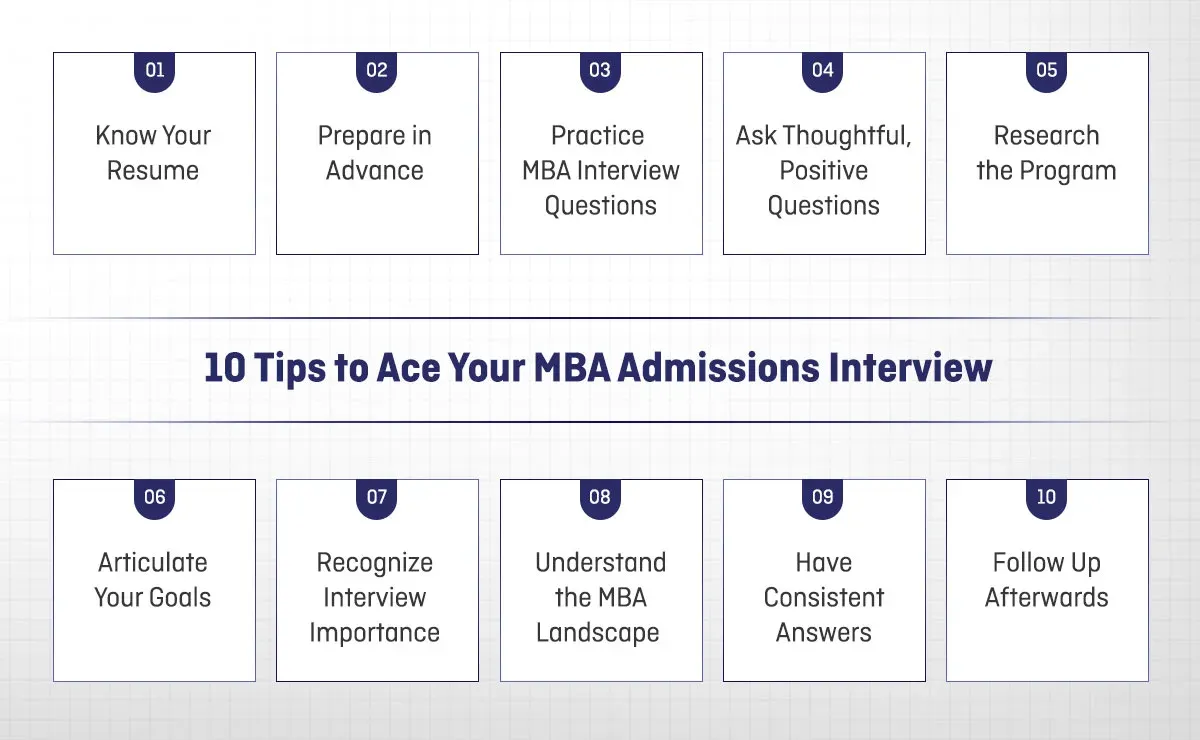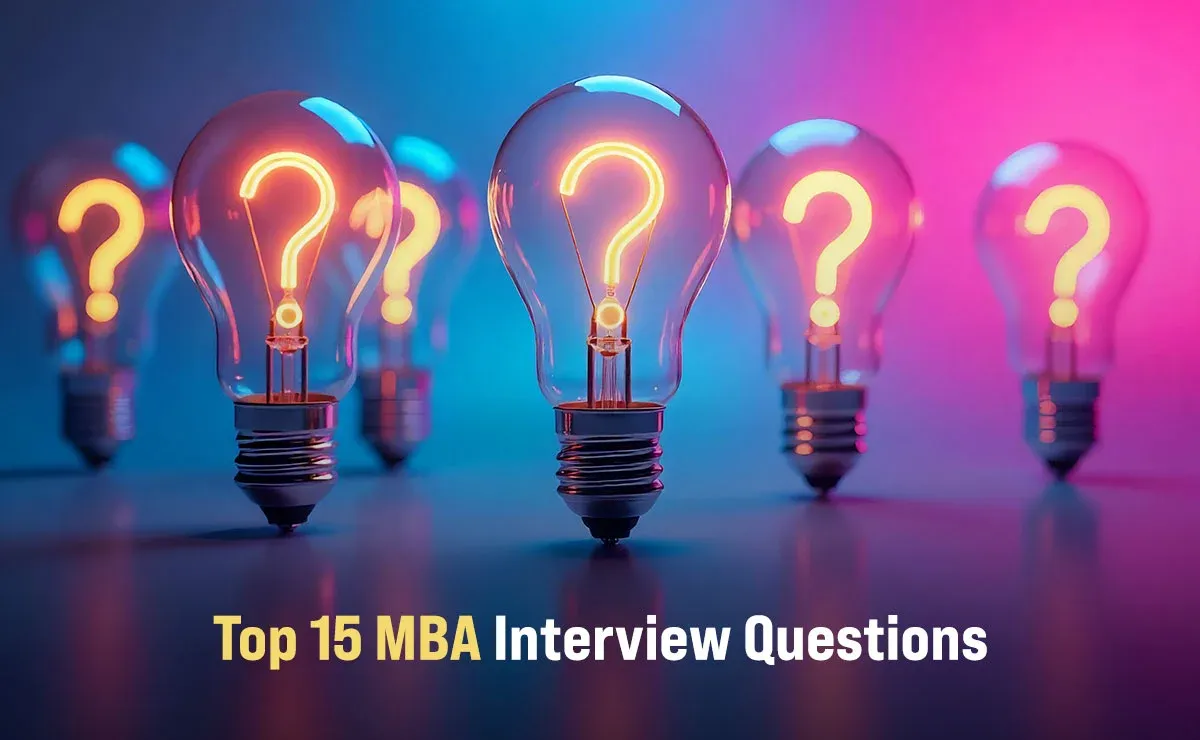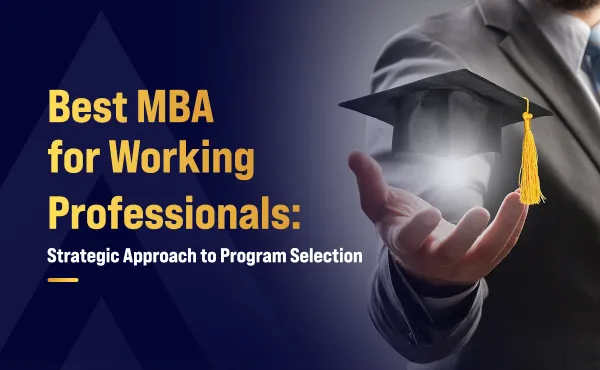How to Prepare for an MBA Interview?

Being shortlisted and invited for an interview at your dream business school is both exciting and nerve-wracking. You’ve made it past your competitive exams (GMAT/CAT scores), essays, and recommendations, and now it’s time that the admissions committee finally get to meet the real you.
So, how should you prepare for this critical stage in cementing your admission to your dream B-school?
To effectively prepare for an MBA interview, diligently research the program and school, deeply self-reflect on your experiences and career goals, and practice answering common behavioral and situational questions, ideally through mock interviews, to refine your responses and boost confidence.
This article delves into this very question, guiding you through steps such as research, preparation, execution, and follow-up so you can walk into your MBA interview confident, articulate, and prepared to impress.
10 Tips to Ace Your MBA Admissions Interview
Your interview with the admissions committee might be the final stage of securing entry to your targeted B-school, but it is also the most crucial one. It’s where the panel evaluates not just your resume, but your personality, motivations, and fit with their program. They have seen your academic achievements so far, but can you also communicate well or perhaps have a flair for leadership potential?
An MBA interview helps identify all these factors as they get to observe how candidates express themselves, handle challenging questions, and interact with others. Therefore, here’s how to make sure you showcase your finest qualities during the interview.

Know Your Resume
Your resume is much more than a summary; it's a blueprint of your achievements and mindset.
- Highlight Signature Moments: Select 2–3 standout accomplishments (such as leading a cross-functional team or launching a new product line).
- Build a STAR or CARL Story Bank: Structure each example with Situation, Task, Action, and Result (or CARL—Context, Action, Results, and Learning), ensuring succinct, powerful delivery.
- Anticipate the ‘Why?’ and ‘How?’: Interviewers often dig deep through their questions. Hence, prepare to explain the rationale behind your decisions, your contributions, and lessons learned with clear metrics and reflections.
Prepare in Advance
There’s no substitute for thoughtful preparation and advance planning, as it helps transform nervousness into confidence. To get started:
- Know the Interview Format: Schools may conduct one-on-one, panel, behavioral, case-based, or group exercises. So, tailor your prep accordingly.
- Talk to Alumni & Current Students: Ask about interview structure, question styles, and any "unexpected" moments to alumni and current students. First-hand insight is invaluable in this process and helps you prepare for every possible scenario.
- Check Key Logistics: It may not look like the most important factor, but do double-check the date, time (including time zone), venue or virtual link, dress code, and contact details to avoid any disruptions.
Practice MBA Interview Questions
While each college has its own style, certain questions recur across programs.
- Build a List of Questionnaires: Gather frequently asked questions like “Tell me about yourself,” “Why our MBA program?” and behavioral or situational questions. Prepare 2–3 insightful, open-ended questions that go beyond brochure facts.
- Mock Interview Simulation: Role-play with peers or coaches to simulate different formats and get constructive feedback on delivery and body language.
- Record and Review: Video or audio recordings help you detect filler words, flat tone, or awkward pauses and improve clarity.
Ask Thoughtful, Positive Questions
Asking thoughtful questions to the interview panel will demonstrate your genuine interest and level of intellectual curiosity.
- Avoid Obvious Questions: Skip asking basic questions, the answers to which you may very easily find over the internet, like acceptance rate, etc.
- Ask Questions that Have Depth: Demonstrate genuine interest and that you have done the research. A question like "Can you share a student-led initiative that influenced the curriculum?" will have a considerably greater impact on conveying your intellectual curiosity to the interviewer.
- Personalize Your Questions: Lastly, if you know your interviewer’s background (alum, faculty member), inquire about their journey or favorite aspects of the program to establish a positive connection.
Research the Program
A deep understanding of the program demonstrates intentionality and suitability towards the program. It also rightfully helps you tailor your answers and beat generic flattery.
- Know the Curriculum: Identify core modules, electives, and experiential learning components relevant to your goals. Within that, know which core courses excite you and which electives will help you pivot or specialize.
- Faculty & Centers: Highlight two or three faculty members or research hubs that resonate with your academic passions and explain why.
- Explore Student Life: Learn about clubs, global study modules, or case competitions where you can contribute meaningfully.
Articulate Your Goals
Clearly mapping your career objectives tells the interviewer you're driven and strategic. It demonstrates your direction and ambition and ties your past, present, and future together.
- Short-Term Goals (1–3 Years Post-MBA): Specify the industry, function, or role you’re targeting post completion of your MBA degree (e.g., “management consultant in digital strategy”).
- Long-Term Vision (5–10 Years): Describe your aspirations, whether it is leadership, entrepreneurial, or to deliver social impact.
- Link to the MBA: For each goal, explain how the program’s undertaking and resources like specializations, network, and experiential labs will propel you forward towards your goals.
Recognize Interview Importance
Regardless of the format, treat your interview as a pivotal stage in the evaluation process. Whether in-person or virtual, your interview embodies your candidacy.
- Professional Presence: Dress in business-professional attire, maintain good posture, and project confidence through steady eye contact.
- Virtual Best Practices: For online interviews, always check your audio, video, and connectivity beforehand to prevent unexpected issues. Also sit in a quiet, well-lit environment to minimize on-screen distractions.
- Mindful Communication: Speak clearly, modulate your tone, and use deliberate pauses to underscore key points. Also listen to all the questions carefully so that you can articulate and respond mindfully.
Understand the MBA Landscape
Different programs and interviewers employ different techniques, and you must hence be ready to adjust to each environment.
- Behavioral vs. Case Interviews: Some interviews focus on stories from your past and what led you to the path you’ve chosen. Others jump straight into assessing your analytical thinking capabilities through mini-case studies.
- One-on-One vs. Panel: One-on-one interviews are quite straightforward, but for panel interviews, you distribute your attention evenly and address each interviewer by maintaining eye contact and listening.
- Team Exercises: Wharton’s Team-Based Discussion, for example, tests collaborative problem-solving. Practice group engagement and balanced contributions for situations such as this.
Have Consistent Answers
Your story needs to align everywhere, from your written application to your interview responses.
- Message Cohesion: Ensure your career narrative, motivations, and goals are consistent across essays, recommendations, and verbal answers.
- Honesty & Authenticity: Admission officers are trained to recognize inconsistencies, exaggerations, or other discrepancies. Hence, speak truthfully to build trust with your evaluators.
Follow Up Afterwards
A polished follow-up at the right time reinforces both professionalism and interest. It can even be a strong thank-you note to reinforce a great impression.
- Send Prompt Thank-You Notes: Within 48 hours of your interview, email each interviewer with a thank-you note. Reference a specific pain point or insight from your discussion that was memorable to you in order to differentiate yourself.
- Reiterate Enthusiasm: Wrap up by restating why the program is the ideal match for your aspirations.
Bonus: Avoid Common Pitfalls
- Don’t Ramble: Keep answers value-driven and yet concise. Since an MBA interview typically lasts 30–60 minutes, long-winded responses cost you valuable time.
- Tailor to Each Program: Interviewers expect candidates to demonstrate a strong fit with their program. That means you should reference program-specific details accurately and meaningfully, not just generic phrases that could apply anywhere.
- Be Genuine: Avoid sounding overly polished or artificial. Interviewers respond best to thoughtful, sincere conversations.
Top 15 MBA Interview Questions
Here are the top 15 MBA interview questions along with strategies on how to tackle each effectively, combining general insights, resume-based context, and situational judgment:

- Tell me about yourself.
Craft a 2–3-minute narrative that connects your background, career journey, and motivation for pursuing an MBA. End with why you’re applying to this school.
- Why do you want to pursue an MBA now?
Explain what prompted your decision to go for an MBA after graduation or work experience, such as a career plateau, a pivot, or leadership aspirations, and why this is the right time (e.g., 4–5 years of experience, industry shift, etc.).
- Why this school/program?
Show that you’ve done your research. Mention specific courses, clubs, professors, or cultural aspects that match your goals. Avoid generic answers or mixing up schools — accuracy and personalization are key.
- What are your immediate career objectives and future ambitions?
Provide a clear vision. Your short-term goal should be specific (e.g., consulting at McKinsey), and your long-term goal should show broader impact or ambition (e.g., launching your own fintech venture).
- What would you consider your primary area for growth?
Pick a genuine but manageable flaw (e.g., presenting to groups) and demonstrate your efforts to overcome it. Steer clear of overused answers like “I’m too detail oriented.”
- Which accomplishment on your resume brings you the most pride?
Select one high-impact achievement (e.g., leading a product launch or mentoring juniors). Apply the STAR technique (Situation, Task, Action, Result) to articulate it clearly.
- Share an instance where you fell short of meeting a goal or standard.
Own your failure honestly, explain what you learned, and share how you've changed your behavior or approach since then.
- Describe a leadership experience of yours.
Pick a time you motivated a team, resolved conflict, or led under pressure. Focus on decision-making and team impact, not just the title.
- Tell me about a time you worked with someone very different from you.
Highlight adaptability, empathy, and communication. Show how you learned from the experience and achieved a productive outcome.
- How would you contribute to our campus community?
Mention student clubs, cultural initiatives, peer mentoring, or industry-related activities you would lead or join, based on your background and interests.
- What’s your biggest professional challenge so far?
Choose a challenge with measurable stakes, show resilience or creativity in solving it, and connect it to how the MBA will prepare you for future challenges.
- What key milestones do you aim to reach by earning an MBA?
Tie your answer to specific skills you want to build, industries you want to break into, or leadership roles you aim to pursue. Link back to the program’s offerings.
- What are your concerns about getting an MBA?
Be honest but strategic. Concerns like "stepping away from work" or "return on investment" are fine, as long as you show you've thought it through and planned accordingly.
- How will you take advantage of our resources?
Cite specific elements: career services, entrepreneurship labs, alumni networks, or international opportunities. Show you’ve aligned them with your goals.
- Do you have any questions for me?
Always say yes. Ask 2–3 thoughtful, personalized questions like:
- “What differentiates your alumni network from others?”
- “How has the program evolved in the past few years?”
Avoid easily Googleable or generic questions.
Summing Up
An MBA interview is your opportunity to bring your application to life, showcasing the person behind the numbers. By knowing your resume inside out, practicing key questions, researching programs thoroughly, and refining your personal narrative, you’ll enter the interview room ready to engage in a meaningful dialogue.
Don’t forget to send a timely follow-up and assess your interview to refine future performance. With diligent preparation and genuine enthusiasm, you’ll be well on your way to acing your MBA admissions interview and taking the next big step in your career journey.





